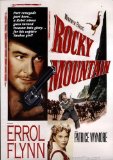
| Cast: | Errol Flynn, Patrice Wymore, Scott Forbes, Guinn 'Big Boy' Williams, Dickie Jones, Slim Pickens |
| Genre: | Western/Action/Adventure |
| Director: | William Keighley |
| Screenplay: | Winston Miller & Allen Le May from Le May's story Ghost Mountain |
| Cinematography: | Ted McCord |
| Composer: | Max Steiner |
Neither director William Keighley nor actor Errol Flynn are remembered for being heavy-hitters in the western genre, but the two collaborated for a low budget, remarkably grim effort in the 1950 "Rocky Mountain." Flynn is, of course, remembered for being the king of the sound swashbucklers, even though he did a total of seven westerns, which he claimed to hate. In most of his westerns, Flynn's disdain shows in his performances. The younger Flynn rightly assumed his personality was not a good match.
Indeed, Flynn's plasticity as an actor mars many of the films from his first decade, including certifiable masterpieces, such as "The Adventures of Robin Hood" (1938). Modern audiences understandably have a difficult time with Flynn's phallic brandishing of his chest while eking out, "Come on men, let's win one for her majesty, the Queen." One can easily understand Bogart's dismissal of the young Flynn's acting as "phony". Later, in his last three years, Flynn was a too far gone, cirrhosis-ravaged caricature in films such as 'The Sun Also Rises" and "Too Much, Too Soon." (in the latter he played idol John Barrymore). Critics of the time praised his performances in these films as somehow authentic, but today they register as a final, pathetic stab by an actor who realized that his hedonism had defeated his potential as an artist. In between these two extreme phases, Flynn gave a number of interesting, world-weary performances in mediocre to good films.
Starting in the late forties, the level of plasticity in Flynn's acting diminished in favor of a more subtle realism. He is much more interesting and mature as an actor in "The Adventures of Don Juan' (1948) than he is in his swashbucklers of the thirties, even if the film, as a whole, is not as good as any of those. Critics rightly praised his earthy acting abilities in the war melodrama "Objective Burma" (1945), but the film offended with the omission of British presence and was unfortunately short-lived. Likewise, Flynn is far better in the Raoul Walsh directed (and underrated) "Silver River" (1948), than he is in any of his earlier westerns, including the lavishly budgeted and decorative "Dodge City" (1939), in which Flynn's superficiality is woefully apparent.
As good as Flynn is in "Silver River" he is just as effective in Keighley's "Rocky Mountain." Keighley is mostly know for being fired as director from the afore mentioned Robin Hood. Apart from that, he competently directed a number of routine efforts, but never really had a visionary grasp on any of his projects. Perhaps re-teaming with Flynn for 'Rocky Mountain" was an inspiring chance to make amends for Robin Hood, since it is a cut above Keighley's normal standard, even though his lack of a directorial imaginative touch is still apparent.
A poor choice was made in the film's narration, and it is a serious flaw, even if it does have a bit of unintentional irony in being narrated by a character who dies. A good choice lies in the omission of the usual comic relief found in most of the movies starring Flynn. Thankfully, the ham antics of an Alan Hale are nowhere in sight to disrupt the downbeat milieu.
Flynn is the grizzled Lafe Barstow, captain of a rag tag Confederate army, sent to California, by his superiors, to raise a guerrilla force. The New Mexico desert landscape is bleak, barren and strikingly expressionist, echoing the resigned fate in store for Barstow and his unsavory team. "Rocky Mountain" prefigures the stark characteristics of flawed protagonists and character-driven, fatalistic plots that populated the genre in its 1950’s jubilee.
Barstow and his men sidetrack their mission to come to the rescue of a stagecoach being attacked by Shoshone. Joanna Carter (Patrice Wymore, who became the third and last Mrs. Flynn shortly after filming) is the lone survivor of the stagecoach. She is also the fiancée of a Union officer who will soon appear to further disrupt plans. One expects a romance to follow between Barstow and Carter, but, thankfully that never materializes. Instead, Carter is taken hostage by the empathetic Barstow.
Wymore is effective in her equally empathetic performance, as is Slim Pickens and Flynn regular Guinn "Big Boy" Williams. Keighley admirably keeps the extrovert antics of those two character actors in check, eliciting surprising, low-key performances. Keighley may not have been the most assured director in Hollywood, but he was an actor's director who gave his star and cast well-rounded roles, making one wish Flynn had been able to work with this director more often. Flynn uniquely rises to the occasion, proving he could be a hell of an actor when given the opportunity by a director who wanted a bit more than the typical role of merely being "Errol Flynn."
"Rocky Mountain" ends on a true blue note, but not before Barstow engages in a last act of heroic gallantry. However, this time Flynn's on-screen heroism springs not from chest-beating, flashing teeth, or a Captain Blood styled patriotic call to arms. Instead, his chivalry is a shrugged, last gasp, fully accepting the consequences for choosing a human life over the good of the cause. Barstow's choices even impress Carter's sourpuss of a fiancée. Of course, there is nothing more gallant than placing the individual over the movement. It's downright biblical.
   |